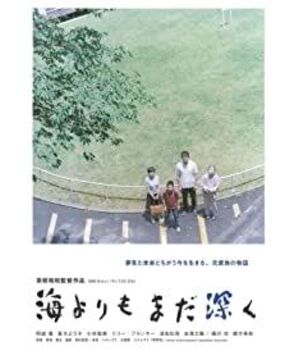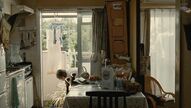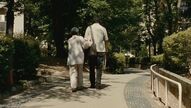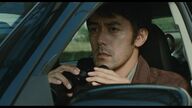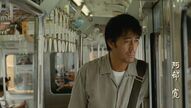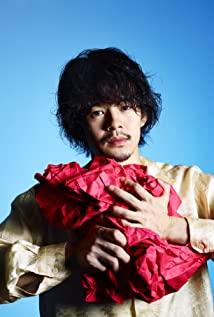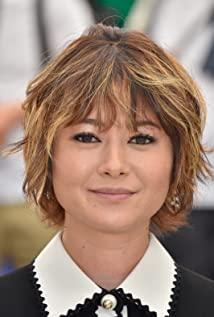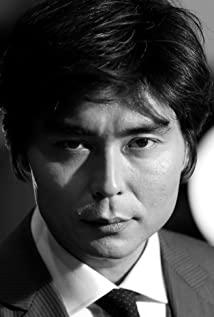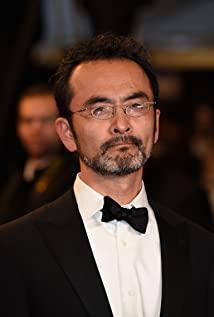In May 2016, the film "Deeper than the Sea" (海よりもまだdeep く) directed by Hirokazu Kore-eda was released in Japan. The title of the movie is taken from a lyric in Teresa Teng's Japanese song "Farewell" (premonition of parting). The story content and starring lineup of "Deeper Than the Sea" are related to the 2008 release of "Walking Away", which can be regarded as sister chapters; but the difference between the two is that in the eight years, the director was Ee and starring Abe Hiroyuki. All have children and become fathers, so this film adds the viewpoint of "sons in the eyes of fathers" on the basis of "parents in the eyes of sons". The filming is based on the "Asahigaoka Danchi" in Kiyose City, Tokyo, where Hirokazu Kore-eda lived in his youth, and the director's own childhood memories are also incorporated into the details, which can be described as another delicate and touching sincere work. In the late autumn stage of life, from the age of 40 to the age of 50, what thoughts did Hirokazu Koreeda, who has become a father, think about in the process of filming and producing "Deeper than the Sea"? The following translation is from Hirokazu Kore-eda's column serialized in the magazine "SWITCH", with a total of three issues (Vol34.No.4~6); the creative background of "Deeper than the Sea", the director's own memory, and the role of the mother. Ms. Tree Schilling came to talk. —————————————————— Hirokazu Koreeda's "SWITCH" column serialized "Bluer than the Sky" ) [Returning to my hometown for the first time] The latest movie "Deeper than the Sea", which was shot on the stage of the Dandi where I once lived, is a special serial reviewing the experience before the completion of the film and the memories of the Dandi - Translator's Note: In order to improve the efficiency of various infrastructure and logistics necessary for life and production, residential buildings or industries with similar uses are concentrated in a building group in the same area. Divided into industrial land, agricultural land, residential land and so on. The group land in this article refers to the residential group land. In the second half of the 1950s, public housing in Japan began to rise. The interior of this type of house is equipped with modern facilities such as automatic flushing toilet, bathtub, kitchen with dining room and balcony, which is the living environment that people dreamed of at that time.
About fifteen years ago, I had the idea to make a movie with the dandi as the background. That was when I was grateful to Mr. Yata Ryoka's manga "Air Doll" and wrote a plan for the filmization of the work. Originally, the place where the air dolls (ie inflatable dolls) as the protagonists live together with men was set as Danji; an old house with more than 40 years of construction history on the outskirts of Tokyo. The bulimic girl and the dementia old lady who appeared in the movie have similar attributes. They live in the same building in the group and fill the emptiness in their hearts in their own ways. The opportunity for the formation of this idea was probably after my father passed away, and I went back to my hometown after a long absence to visit my mother who lived alone in Dandi. Get off at the familiar bus stop and go to the nearby "French" cake shop to buy a Montblanc cake. Walking home according to the previous route, I suddenly saw that in the park where I used to play as a child, there was a "no entry" fence on the periphery of the large shell-shaped slide. Later, I asked my mother to find out that a child accidentally fell and was injured while climbing the outer side of the shell. When I was a kid, I used to climb the outside of the shell while playing the game of ghost hunting, doing acrobat-like movements and chasing with my friends. Even if I fell off the slide, I could only blame myself for being careless, not the slide. No, this was a common norm in our hearts at the time. When I returned to my hometown for the second time, the slide had been completely removed without leaving a trace. Now it has become a place for the elderly to rest. The reason is not that the child was injured, but because there is no child in this group, the slide is useless. The evidence is that the grass field where many people practiced baseball and football has grown very dense because of the lack of people all the year round, and the stationery store in the shopping street has also been converted into a rehabilitation center for the elderly. All the activities here are like slow motion, like still pictures, in the landscape where the breath of death lingers, only the parking lot and the trees near the park continue to grow, release their vitality, and are about to turn the five-story group land. Cover the whole. (Ah, I really want to shoot...) That's when I got the idea. Recalling the feelings at that time, when we started to prepare for the shooting of "Air Doll", we and the representative of Dandi, the popular UR (Urban Renaissance) Negotiations with the Agency, referred to as UR), did not go well. According to the staff of the production department, it was not easy to obtain the filming permission of the public house, and the setting of the delicate inflatable doll (air doll) living with the residents of the group seemed even more impossible. If you want to shoot successfully, you must obtain the permission of the municipal council and obtain the consent of all the residents of the danchi. Because it was so difficult, we eventually had to give up. Maybe it was a blessing in disguise. Later, the movie was changed to describe the life stories of different people during the short-term rise and fall of land prices after the collapse of the bubble economy. I think that film reflects the other side of the city of Tokyo in the context of that era very well. This time, my long-cherished wish has finally been fulfilled, and a new film will be made with the public housing as the background and the Asahigaoka Danji in Kiyose City, where I have lived for more than 20 years, as the filming location. It may be difficult for those who have never lived in a dandi to understand that even in the same dandi, or rather living in the same dandi, there is a clear class relationship between households. To put it simply, the number of rooms, interior layout and rent of this house can be known from whether the room number is odd or even; for example, No. 101 is 2DK, and No. 102 is 3DK. Further, if Buildings 2-3 and 2-4 are rental houses, and Buildings 2-6 are commercial houses sold by households (divided), since then, Buildings 2-6 will have a higher grade. I haven't been to commercial housing very often, so my memory may not be reliable, but the size of commercial housing also seems to have two levels. Just across the road from this danchi is a single-family building called "Seibu Residence" (one-family building). If the residents of the group's residential area have enough money, their whole family will move here, which is also a kind of "promotion". In the past, if you haven't been to someone's house, you wouldn't know the difference between home and home, but after you have a dando, you can immediately understand the gap through the address. Dandi is one such place to surface income disparities. At that time, children played together and didn’t care about each other’s family environment, but most of the children living in commercial housing were dressed in trendy fashion and interested in hobbies. Children in rental housing learned abacus, while children in commercial housing mostly learned piano and violin. Most of the mothers who live in rental housing like my mother are temporary workers in factories near the community, while the mothers in commercial housing are almost all full-time housewives. Residents of rental housing mostly take buses and trams to commute, while residents of commercial housing have private cars. The self-respecting mother thought it was a shame to live in a rented house when she got older, and she also wanted to move to a commercial house, or even a better single-family building, and my father and I didn't have the ability to fulfill my mother's wish at that time. strength and willpower. The setting of this movie and the situation of family members are all fictional, but the mother played by Ms. Shu Xilin, the character's unsatisfactory life with her own life, and a series of coping measures taken to calm down this kind of psychology, many of which are Based on my own mother. When I decide to shoot a certain movie, I always first consider what points need to be paid attention to in order to make the space presented in the film more closely resemble the way ordinary people sleep, eat, and live. Get it wrong, and viewers will be unable to speculate on the family's history from the scene in front of them.
For example, when a family of four (father, mother, daughter, son) eats around a table in the living room, the mother's seat is naturally determined, but whether the father wants to sit at the table with the family or sit alone in front of the TV Woolen cloth? These all depend on the relationship between the husband and wife and the habits that the two have accumulated over the years. In a 3DK family with two children, the one who lives in the south-facing, well-lit room tends to be the strongest of the two. In this movie, we intentionally gave the south-facing room to my sister. Of course, this also means the power relationship between the siblings to some extent, but the north-facing room is very close to the entrance, and even if you go out late at night, your parents will not find it, which is its advantage. When boys go to high school, they will automatically have a need for this cold north-facing room. Thinking of these, while scrutinizing and designing the next actions of the characters, even if it is only a limited space like Dandi 3DK, it instantly has the possibility of infinitely extending the width and depth in time and space.
【Second time machine】
In my opinion, the most important things to pay attention to when making a film are "memory", "observation" and "imagination". Although the proportion of the three elements will be adjusted according to the nature of the work, on the whole, the three elements are indispensable. In "Air Figure", "imagination" accounts for the largest proportion, and "Walking" is "memory", among which the memory related to mother is the most. "Haijie Diary" is adapted from a set of self-contained comic works, so when shooting, the main focus is on the running-in with the original work, and the shooting progress is advanced through careful observation, analysis and feeling. It's also fun to shoot this way, and I've learned a lot from it. "Deeper than the Sea" filmed this time is a film based on "memory". If you want to ask whose memory comes from, it is undoubtedly me. However, this is not an autobiographical film either. For example, the protagonist Randa (played by Hiroshi Abe) has always wanted to become a professional novelist, but it did not go well. He could only transfer to a detective agency in the name of investigation. Over time, this job gradually began to become his regular job. His wife Kyouko (played by Yoko Maki) is fed up with such a husband and leaves him with her only son, Mago (played by Yoko Yoshizawa) after the divorce. Many became an "ex-husband" and "ex-father" who could only see his wife and children once a month. Obviously, such a setting itself is already a fiction, if it is a documentary, it would be incredible. So, which part reflects my recollection? "Deeper than the Sea" and "Never Stop Walking" can be considered sisters in terms of the story itself and the cast members, but the difference between the two is that in the eight years between the two works, Mr. Abe and I have become Father. Both of them are in their 40s and 50s, and at this age, the purpose of life (which is of course completely different from childhood) begins to become more and more clear. Also in this late autumn stage of life that is constantly losing, the most precious and rare gain for the protagonist is his biological son. That is to say, the film takes a "father" point of view. If "Walking Nonstop" depicts the father and mother in the eyes of the son, "Deeper than the Sea" adds the point of view of the son in the eyes of the father on this basis. The protagonist is a son, a husband, and a father at the same time. As such an existence, this film hopes to convey more and more complex things. In fact, my memories are not reflected in many of the protagonists, but more on the boy Zhenwu. Shingo is a very calm child who speaks in a low voice and is ashamed of adults who speak loudly. Although he is a member of the junior baseball team, it is not an official one, but a substitute—a four-ball substitute, and his dream is to be admitted to a civil service in the future. I was also a member of the junior baseball team, the No. 1 right winger, and the regular player (unlike the setting in the movie). However, due to his small size and lack of strength, he also aimed at four balls at that time (this is a documentary). Fortunately, I run fast, and stealing bases is the only strength I can show. After witnessing the incredible home run hit by No. 4 hitter Shima-kun, I knew right away that I had no talent for baseball. Even so, "professional baseball player" is still filled in the dream column on the elementary school graduation yearbook. At that time, I didn't have the innocence that adults want to see in children, on the contrary, there was only calmness. Because I have been such a person since childhood, among the twin brothers who appeared in the movie "Miracle", the role of the younger brother Ryunosuke did not come from my own memory, but was created by observing the words and deeds of young actor Maeda Toshiro. When I was in the fourth grade of elementary school, my father took me to buy a lottery ticket somewhere near the east exit of Ikebukuro Station. Since I'm left-handed, I decided to grab tickets with my left hand. To this day, my heart pounding when I picked those 10 lottery tickets is still in my memory. But when I happily went home and told my mother, my mother was furious. My mother, who grew up under the care of my brothers, always hated my father's gambling habit. It's just a lottery ticket, what a big deal! Only at times like this do I stand on the same side as my father. Since then, whether it's playing marbles or betting on horses, my mother's face comes to my mind, and I feel a little guilty at the same time. Perhaps the reason why I chose the film, a job with a very turbulent career, came not from my mother who loved to watch movies, but from the influence of my father who loved to gamble. From this point of view, many people who are addicted to gambling also carry my memory of my father. In addition, his experience of returning to his hometown to visit his mother who lived alone in Tuandi also overlapped with mine. That's right, to put it simply, the characters and plots that appear in this movie hold various memories of me as a son, husband, and father, but the pronouns and relationships have changed. Nonetheless, it is not an autobiographical work. Even if my memory is strongly projected on a character in the film, once the setting is changed, a sense of wonder arises spontaneously. The character began to gradually strip me away, and became alive with its own characteristics. Some might call it "imagination," but I'm used to calling it "observation." It's hard to tell the specifics, but taking a part of yourself as the "other" of the object of observation can give rise to a more critical point of view, and the audience will agree with it with a smile. I think so. What was different this time was that the filming location was in Danji, where I have lived for nearly 20 years, and the plot of the story unfolded in a nostalgic landscape. The story itself is fictional, and part of the plot is documentary. The mother and son of the characters are played by Ms. Shirin and Mr. Hiroshi Abe, so they are also fictitious. However, the experience of walking with my mother along the path where the rhododendrons bloomed beautifully in the dandi really came from me, and it is a documentary. Incorporating the dialogue with my mother on that road into the lines of the script, and hearing it from Ms. Schilling, standing beside the camera and watching the backs of the two, I fell into a trance of taking a time machine back to the memory scene. This incredible feeling continues during filming, editing, and even now after the film is made. [Final Answer: Hatchet] Record what happened before the production of "Deeper than the Sea". In this issue, we will talk about the role of Shoko, who bears my memory of my mother, Ms. Shu Shirin. The story itself is fictional, and part of the plot is documentary. The mother and son of the characters are played by Ms. Shirin and Mr. Hiroshi Abe, so they are also fictitious. However, the experience of walking with my mother along the path where the rhododendrons bloomed beautifully in the dandi really came from me, and it is a documentary. Incorporating the dialogue with my mother on that road into the lines of the script, and hearing it from Ms. Schilling, standing beside the camera and watching the backs of the two, I fell into a trance of taking a time machine back to the memory scene. This incredible feeling continues during filming, editing, and even now after the film is made. [Final Answer: Hatchet] Record what happened before the production of "Deeper than the Sea". In this issue, we will talk about the role of Shoko, who bears my memory of my mother, Ms. Shu Shirin. The story itself is fictional, and part of the plot is documentary. The mother and son of the characters are played by Ms. Shirin and Mr. Hiroshi Abe, so they are also fictitious. However, the experience of walking with my mother along the path where the rhododendrons bloomed beautifully in the dandi really came from me, and it is a documentary. Incorporating the dialogue with my mother on that road into the lines of the script, and hearing it from Ms. Schilling's mouth, standing by the camera and watching the backs of the two of them, I fell into a trance of taking a time machine back to the memory scene. This incredible feeling continues during filming, editing, and even now after the film is made. [Final Answer: Hatchet] Record what happened before the production of "Deeper than the Sea". In this issue, we will talk about the role of Shoko, who bears my memory of my mother, Ms. Shu Shirin.
"Deeper Than the Sea" is the fifth film I've worked with Ms. Tree Shilling. The first time I saw her was in 2007. After the script of "Non-Stopping" was produced, I thought that there was no one but Ms. Xilin who could play the role of the protagonist's mother (Nianko Yokoyama), who bears the memory of my deceased mother. So I took the initiative to contact her. I've heard people say she's a tough person to deal with before and seems to often make co-star actresses cry. Thinking of this, probably not only me, but all the staff are very nervous. "The weather is nice, so I came here on foot." enter ENGINE After the meeting room of FILM company, Ms. Schilling said that she found someone selling delicious-looking bananas on the side of the road, and took them out of her bag and put them on the table (although my impression was dry sweet potato fries, but Ms. Schilling definitely said it was bananas, based on her memory here). After sitting down, she looked back and forth at President Yasuda and producer Kato next to me, and said, "It's still too early to leave the filming, so I'm so eager to find me because where did I hear that I'm a difficult person to deal with? ' and then chuckled. "How could it be, there is no such thing..." I incoherently mentioned the importance of the mother's role with a wry smile (no one asked), and Ms. Schilling looked at me with a smile on her face. From the first minute of meeting, the initiative was completely in her hands. After nearly a decade of working together, Ms. Schilling and I have gotten to know each other very well, and recently I've even begun to wonder if she'll say something to frustrate the co-stars. However, the side who was reprimanded was really uncomfortable. Once at a party, a big figure in the TV industry came to say hello to Ms. Xilin and said, "I worked with you on the TV series OO before." Ms. Xilin didn't use "Ah, that's really appreciated." Instead, he looked at the business card handed over by the other party, looked at the name on the business card and the other party's face back and forth, and said, "I don't remember. Did I really play that?" Cut off the other person's head. There was also an award ceremony, and a big man came to greet her. After listening to the other party's words (not funny to be honest), Ms. Schilling suddenly asked, "Where did you buy this tie?" If it was someone else, doing such a thing would definitely be considered very bad. It's disrespectful, but for some unknown reason, when she came to Ms. Xilin's place, the party who was complained would laugh it off, and even tell it to others as a funny joke. Probably because Ms. Shirin's attitude and language hide a sharp kitchen knife, or a hatchet, that can see through the essence of people and things. Her blunt words are often evaluated as "poisonous tongue" or even "verbal violence", including professional reporters and interviewers, but this is not the case. She would never slander others behind her back, but instead stood in front of the person involved and slashed the hatchet of language high. Clean and refreshing. However, after the other party left, she would pinch the elbow of my shirt next to me and say, "That person's XXX was definitely OO, right!" I love that ordinary people don't care at all, and won't talk about it. Talking, laughing and talking about things as a topic, this trait is very similar to my mother, and it is also the same as the trait of "secular society" itself. I love Ms. Schilling like this, and She is happy together. However, what I respect is Ms. Schilling, who always arrives at the filming site an hour earlier than the appointed time. After arriving by car, she opens the book in the lounge and puts it on her lap, and practices her lines alone with her eyes closed. It was the one who waited until the actual shooting of the scene—for example, the kitchen table in the Dandi residence. How to show that the mother in the play has lived here for 40 years? Should the chair be here? Is the distance from the refrigerator appropriate? Can the kettle be found even with eyes closed? Where should I do something before I sit down? ——Ms. Xilin, who integrates herself into the whole space and concentrates on figuring out the way of interpretation. Those actors who were made to cry because of her sternness were probably because they did not treat the roles and works with the attitude of Ms. Xilin (not the level of acting skills), nor did they have a head-to-head confrontation with her. At any time, the feeling of retreating may be shown. Ms. Xilin on the filming scene was so desperate, even at the expense of shortening her life, to challenge herself and the limits of her acting skills. At this time, her hatchet was waving on her own head - looking at herself with a more critical look than she was strict with others, ready to confront herself at any time. Such a lady Shirin is really beautiful, even with a divine brilliance. Witnessing this gesture, I can't help but think how lucky I am to be able to make a movie with such an actress. Yes, I feel that way from the bottom of my heart. [End] Source of the original text: It is Hirokazu Koreeda's "SWITCH" column serialized translation: Fengman Mirage Building (this content is for communication only, please do not reprint or commercialize it) In-depth interpretation of Japanese culture. Observation, reading and appreciation of Eastern Ying's literature and art, start here. Long press to add follow The works did not have a head-to-head confrontation with her, but showed people with a half-hearted feeling that they might back down at any time. Ms. Xilin on the filming scene was so desperate, even at the expense of shortening her life, to challenge herself and the limits of her acting skills. At this time, her hatchet was waving on her own head - looking at herself with a more critical look than she was strict with others, ready to confront herself at any time. Such a lady Shirin is really beautiful, even with a divine brilliance. Witnessing this gesture, I can't help but think how lucky I am to be able to make a movie with such an actress. Yes, I feel that way from the bottom of my heart. [End] Source of the original text: It is Hirokazu Koreeda's "SWITCH" column serialized translation: Fengman Mirage Building (this content is for communication only, please do not reprint or commercialize it) In-depth interpretation of Japanese culture. Observation, reading and appreciation of Eastern Ying's literature and art, start here. Long press to add follow The works did not have a head-to-head confrontation with her, but showed people with a half-hearted feeling that they might back down at any time. Ms. Xilin on the filming scene was so desperate, even at the expense of shortening her life, to challenge herself and the limits of her acting skills. At this time, her hatchet was waving on her own head - looking at herself with a more critical look than she was strict with others, ready to confront herself at any time. Such a lady Shirin is really beautiful, even with a divine brilliance. Witnessing this gesture, I can't help but think how lucky I am to be able to make a movie with such an actress. Yes, I feel that way from the bottom of my heart. [End] Source of the original text: It is Hirokazu Koreeda's "SWITCH" column serialized translation: Fengman Mirage Building (this content is for communication only, please do not reprint or commercialize it) In-depth interpretation of Japanese culture. Observation, reading and appreciation of Eastern Ying's literature and art, start here. Long press to add follow
View more about After the Storm reviews


